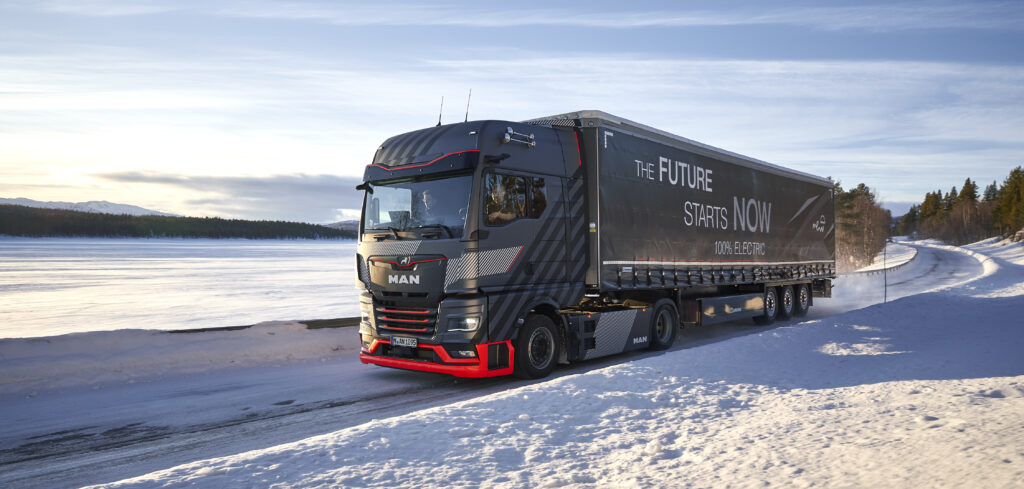The upcoming large-series eTruck from MAN has been put through its paces in the winter conditions of Northern Sweden. The electric commercial vehicle, designed for a daily range of between 600km and 800km, was subject to winter testing from December to March at temperatures as low as -40°C.
During the program, MAN ensured the truck’s driving functions, range, air conditioning and charging behavior all worked correctly over thousands of test kilometers.
“The winter tests were a complete success,” said Dr Frederik Zohm, executive board member for research and development at MAN Trucks & Bus. “Our engineers literally put the new eTruck through its paces day and night under the toughest conditions. The maturity level is already extremely high, and the development team is working with great passion on the further trials to provide our customers with an optimal product for the switch to CO2-free road freight transport.”
Over the four-month period, approximately 30 test engineers worked to ensure the MAN eTruck was on the path toward series production readiness. The team tested the overall energy management, the cooling and thermal management of the battery packs, the interaction and control of the powertrain components, and the charging behavior under the extreme temperatures. Four prototypes were brought to Sweden, each with a different battery, e-motor, transmission, axle and cab setup.
“Interdisciplinary teams are the key to making the eTruck ready for all customer requirements and operating conditions,” explained Rainer Miksch, vice president vehicle testing, MAN Truck & Bus. “Our goal is to be able to cover a large part of today’s application portfolio electrically with the new eTruck. The CO2 -free long-distance transport of refrigerated goods in the classic semitrailer combination will be just as possible as the collection of milk from the organic farmer with the electric food tanker or the low-noise and emission-free waste disposal in the city.”
Several other vehicle and component tests will also be carried out, including the batteries’ resistance to open fire, immersion in water and a free fall to the ground. Individual components and the entire vehicle will be subjected to rigorous crash tests which must be passed and noise measurements and tests on electromagnetic compatibility will also be conducted.
Following the winter testing, the eTruck will be subjected to “hot-land testing” in the south of Spain in temperatures above 40°C and in strong sunlight. This climate will subject components to different heat cycles, and place different demands on the battery temperature control system, the charging management system and the powertrain components.
“Meeting the sometimes extremely different operating conditions with regard to the diverse applications of our customers is the fine art of commercial vehicle development,” said Miksch. “But now that the eTruck has more than fulfilled our expectations in winter testing, the entire test and development team is already looking forward to the upcoming validations and summer testing in order to get one step closer to large-scale production of the electric truck again.”


